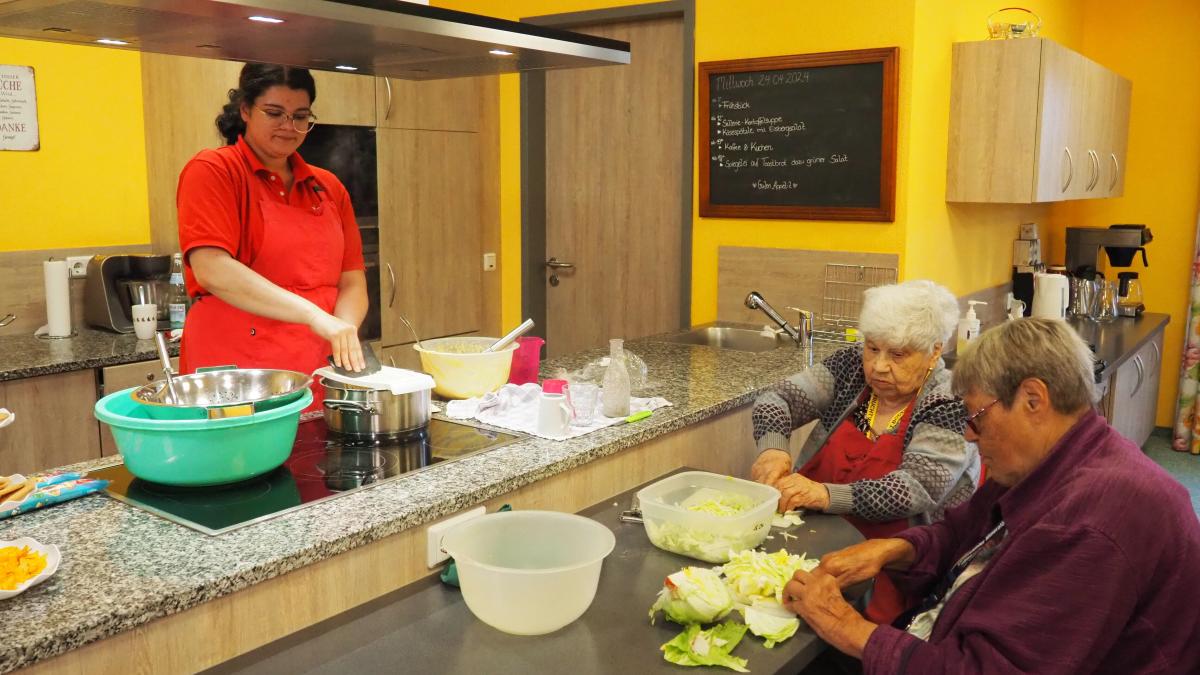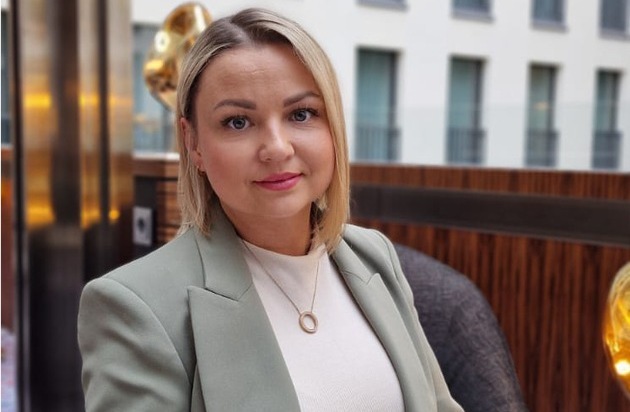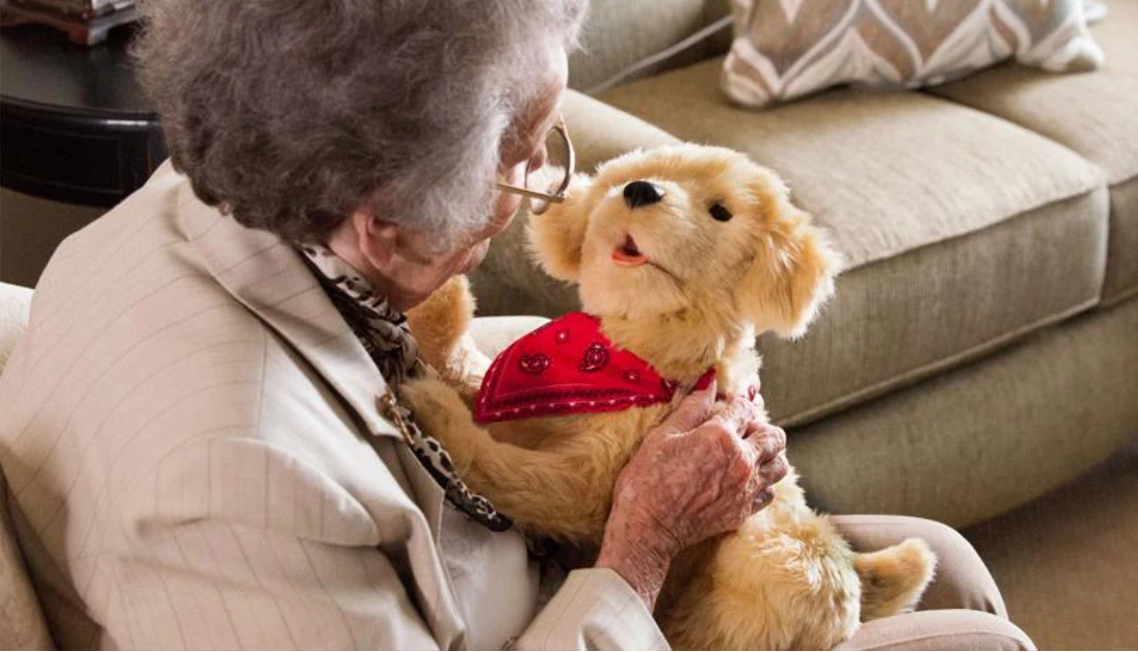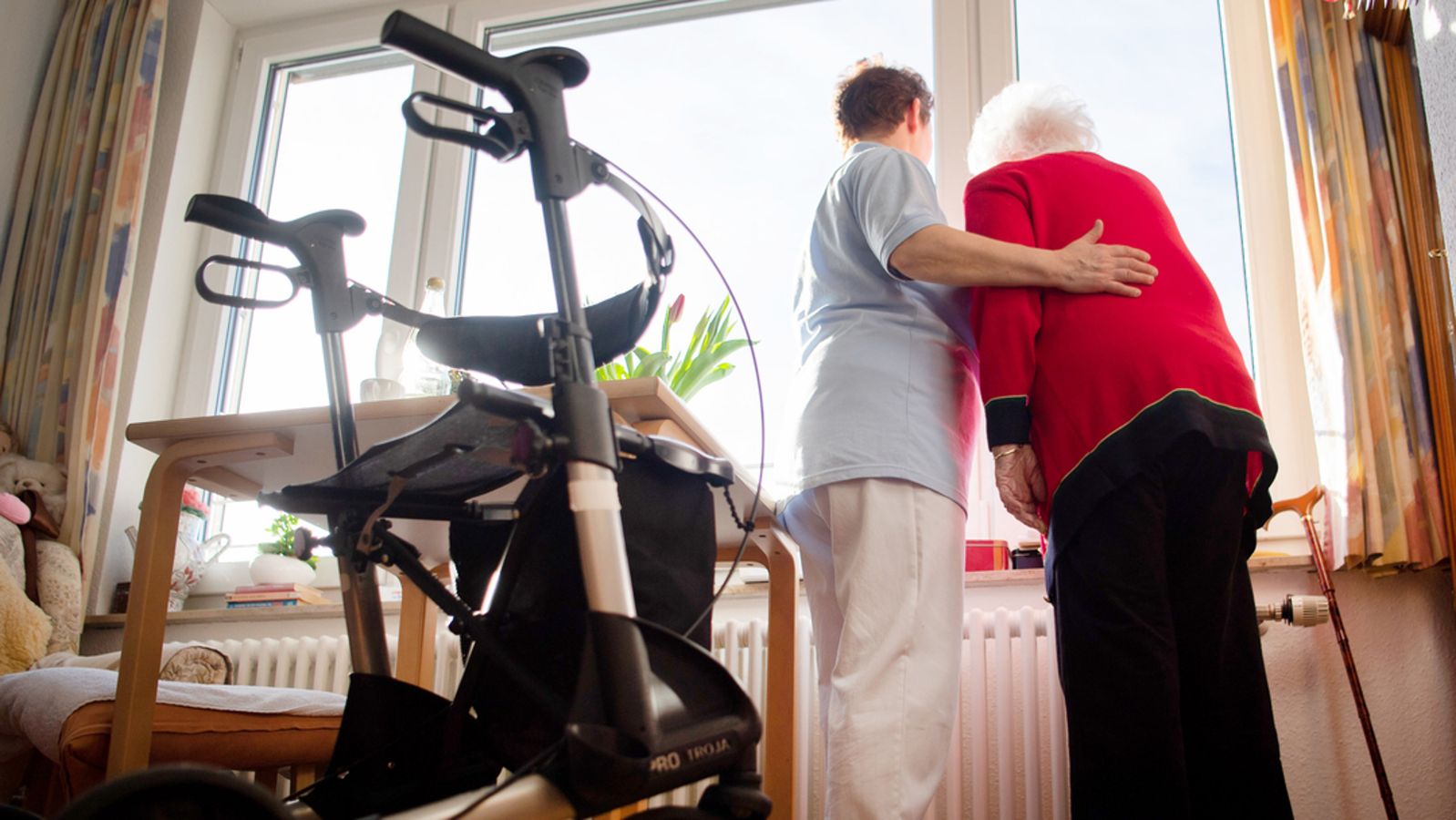Nursing homes are expensive and there is a lack of skilled workers. In Wyhl near Freiburg, they are taking a different approach: residents and relatives help with household chores. The model is now set to come to northern Swabia.
Barbaralore Willmann’s furrowed hands guide the knife expertly through the iceberg lettuce. The 93-year-old is sitting with Maria Hermle at a small table in the kitchen of the “Dorfblick” shared apartment in Haus Rheinaue in Wyhl. It is around 11 a.m., time to prepare lunch. 24-year-old employee Anna Panarisi is cooking while the two older ladies help her. Willmann and Hermle are two of 56 residents in Haus Rheinaue, which is divided into four shared apartments. Each community cooks, washes and lives together. “Everyday life is therapy” is the motto. Residents help as much as they can, which gives them structure and keeps them fit.
Such shared apartments already exist in other places. What is special about Wyhl in Baden-Württemberg, not far from the French border, is not the form of shared accommodation, but rather that care is handled more flexibly here. This is possible because the inpatient facility is subject to outpatient service law. Because the permanent staff provides the basic services, relatives take on mandatory services and outpatient services are also used. Haus Rheinaue is a pilot project for “outpatient care”, a term that combines inpatient and outpatient care. It is the only one of its kind and follows an approach that has so far been lacking in Germany.
New approaches to care are urgently needed. Almost five million people in Germany are currently in need of care, and forecasts suggest that this number will increase in the coming years. At the same time, there is a shortage of skilled workers. More and more people in need of care are therefore being cared for by fewer and fewer nursing staff.
The pilot project has been extended for years
There is quite a lot going on in the shared living space in Wyhl. Things start here around 10 a.m., when most of the people in need of care are up and about. There are a few late risers, though. Willmann, who used to cook often and enjoy cooking, is still happy to help out. “When I feel like it. And when I’m needed,” she says and smiles. She enjoys chatting together. Hermle next to her nods in agreement. “I couldn’t have chosen better,” the 89-year-old comments cheerfully. “I’m staying here, that’s what I said at the beginning.”
But that is not yet certain. Although the Federal Minister of Health Karl Lauterbach At the end of March, the concept was to be made possible in Germany. It is aimed at people who do not yet want to go into a nursing home, but can no longer live at home. “New forms of housing close to the neighborhood” are to be created with it, explained a spokeswoman for the Federal Ministry of Health when asked by our editorial team.
Read also
That sounds like a new beginning. People in Wyhl have been waiting for it for a long time. The outpatient care model has been running as a pilot project for eight years. The model was legally designed to last three years. What would happen after that was unclear. The model project was therefore extended – year after year, and the legal basis is still missing today. “It wasn’t thought through,” says Kaspar Pfister, founder and managing director of the private Benevit Group based in Mössingen near Tübingen, which also operates Haus Rheinaue in Wyhl. There was already a legislative initiative for this in 2021, but it didn’t get that far in the end. The uncertainty is stressful for everyone. Especially towards the end of the year, when the model status expires.

Federal Health Minister Karl Lauterbach (SPD) wants to make “outpatient care” possible in Germany.
Photo: Hannes P. Albert, dpa
The residents have fixed tasks in Haus Rheinaue
Heide Sommer only moved in at the beginning of this year. She brought furniture from home. A large green armchair sits next to the window, a small side table is covered with a lace tablecloth. A small stuffed cat sleeps curled up on her bed and looks pretty real. If you ask her about it, she’s happy. Barbaralore Willmann has been living here since September. She and her husband moved into Haus Rheinaue. He died in February after 62 years of marriage. It wasn’t easy for Barbaralore Willmann to be alone here after that. But she appreciates the community around her. “I’m slowly getting used to it again,” she says, smiling.
In their shared apartment today, there is celery and potato soup, which is clearly advertised on a board. Employee Panarisi praises the hard work of the two older ladies: “I really love them all.” “We love them too,” replies Hermle. In the background, some residents fold laundry, others play cards, supported by on-site staff who have no medical training but have in-house training and help with everyday tasks. These specialists take on the role of the caring relative, a mixture of nursing assistant, housekeeping and daily routine. The people in need of care all have their own jobs in the house: in the kitchen, in the house, in the garden. Some tasks are more popular than others. “Looking after the rabbits in the garden is very popular,” says facility and housekeeping manager Bettina Triantafyllou. Sometimes solutions have to be found within the house.
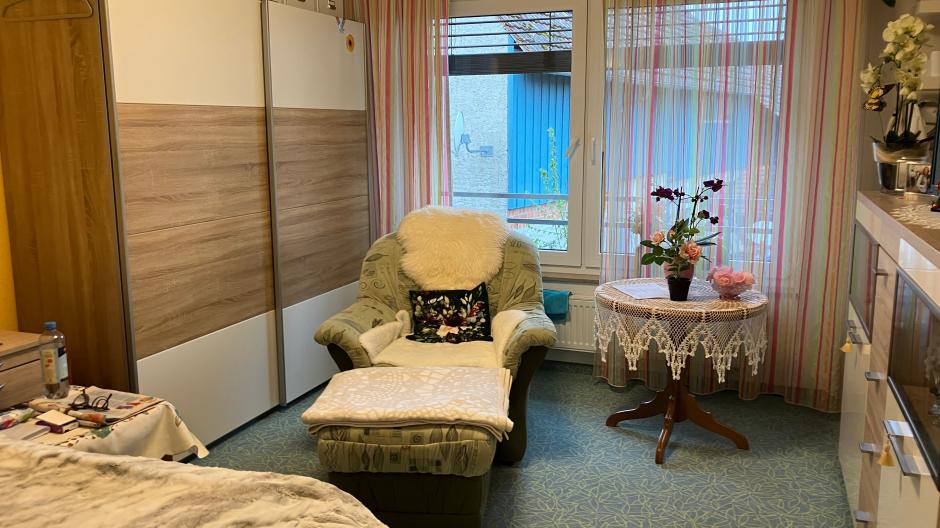
Heide Sommer moved into Haus Rheinaue at the beginning of this year. She has made her room comfortable.
Photo: Anna Mohl
A place in Haus Rheinaue currently costs about 2700 euros
A place in Wyhl currently costs around 2,700 euros, while a comparable inpatient facility in Baden-Württemberg costs around 3,700 euros in the first year, according to Pfister. Haus Rheinaue has fewer nursing staff on permanent staff than comparable inpatient facilities. This is because the staff present during the day take on tasks that are sometimes carried out by nursing staff in the inpatient sector, but for which no medical expertise is actually required – stripping beds or taking people in need of care to the toilet, for example. Or relatives take care of it: they can come at any time and help out in the house. Currently 28 of them do this, they do laundry or help with room cleaning. This allows them to save costs and also gives them more insight into everyday life in a shared flat. This makes the whole thing cheaper.
The nursing staff in the home take care of basic care such as dispensing medication or giving injections. Anyone who needs more support can book either an outpatient nursing service or the nursing service of the Benevit Group. Anyone who cannot pay for this out of their own pocket is entitled to social assistance. Because outpatient service law applies here, staffing ratios and quotas that are otherwise mandatory in inpatient homes are not valid.
Is stambulant the future?
This makes things a lot more relaxed in Haus Rheinaue. “I have already worked as a nursing service manager, and we cared on an assembly line,” reports Christiane Kleemann from the Benevit Group’s central quality management. House manager Triantafyllou also sees the advantages of the concept. “We have to communicate more and offer more.” But it’s worth it. The work is distributed across more shoulders, and relatives feel less guilty when someone in the family has to go into a home. They can better assess what is going on in the house and be more involved. Sometimes, one employee adds, they don’t understand at first that their loved ones are still supposed to work in the house. “But that’s exactly what keeps them mentally and physically fit,” he says. In fact, the most recent report by the health research institute IGES for the umbrella association of health insurance companies confirms that the concept means that residents remain in a low level of care for longer and have to go to hospital less often.
Stefan Arend, founder and managing director of the Institute for Social Management and New Living in Munich, sees the outpatient model as an important development. He has studied various models of retirement provision in ageing societies in depth. “Our dilemma is: How do we ensure care in old age without doing so at the expense of young people?”
He warns against an idealized return to the extended family: “That is romanticizing something, which unfortunately doesn’t help us either.” New housing must move away from outpatient, inpatient and part-time care. Most people are currently cared for at home, and it is often said that the largest care service in Germany is still the family. The decisive question for the future will be how this can work at home. Pfister’s model paves the way for this – not an easy undertaking in the bureaucratized health care system. “I think what Mr. Pfister is doing is brave.”
There should be no further care sector in Germany
Arend sees a major problem in the confusing billing of care services in Germany. “If Lauterbach wants to create another sector with stambulant, this will lead to numerous problems with remuneration and implementation.” He is not alone in his concern: Health economist Heinz Rothgang described this case as “harmful and even dangerous”. There is already “a friction” between inpatient and outpatient care, he said in an interview. Instead, he would like to see care that can be provided regardless of the type of accommodation. Arend sees it similarly. “Perhaps every person in need of care could have a personal budget for services,” he suggests.
The Benevit Group, which already operates 27 residential homes in the house community concept, is planning further locations – one in Buttenwiesen near Wertingen. Although the property already belongs to Pfister, construction is not yet underway. He is waiting for the legal basis. The mayor of Buttenwiesen, Hans Kaltner, hopes that things will move forward soon. Because at present the community of 6,500 residents has few options for elderly care, and relatives often have to travel long distances. This is a burden, especially for older couples. “A home with 60 places would be ideal for us,” says Kaltner. The slow progress is “almost a scandal,” he says. “There are incredibly big obstacles – even though we are talking about an idea that is now well-known and tested. And yet we cannot move away from model status.”
Benevit founder Pfister: “It’s difficult to leave the beaten track”
Pfister is also still a bit skeptical. “It’s hard to leave the beaten track.” But he is convinced that something will and must happen now. He does not think that stambulatory care is the only way. But it is a possible way to face the coming challenges of an ageing society. “I believe that this issue is one of the top five issues that should and will affect Germany. It affects us very intensely,” says the 67-year-old. “Just as you have to balance children and work, you also have to balance care and work.”

